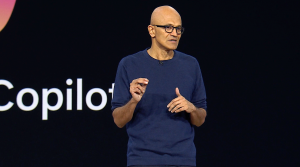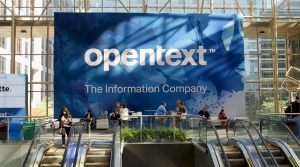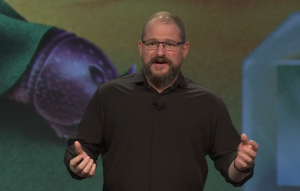Elections, Politics, Big Data. Oh My!
![]() Big data is the Big Deal of 2012. Now that we have systems smart enough to analyze the data that rolls out in droves from our computers, cell phones, and tablets it would be foolish for governments and politics not to get involved in the game of analyzing that for their gain as well. Earlier this year, Facebook announced a deep partnership with Politico, allowing the political site never before seen, unrivaled access to every private status update and message that uses the name of a presidential candidate.
Big data is the Big Deal of 2012. Now that we have systems smart enough to analyze the data that rolls out in droves from our computers, cell phones, and tablets it would be foolish for governments and politics not to get involved in the game of analyzing that for their gain as well. Earlier this year, Facebook announced a deep partnership with Politico, allowing the political site never before seen, unrivaled access to every private status update and message that uses the name of a presidential candidate.
Big data, in its most basic form, is the information that we all generate when we use anything electronic. ZDnet calls it a catch phrase that comes from the high performance segment of the computing world. Then they go on to explain it must clearer, “In simplest terms, the phrase refers to the tools, processes, and procedures allowing an organization to create, manipulate, and manage very large data sets and storage facilities… Just thinking about the problems created by the maintenance of huge, dynamic sets of data gives me a headache,” says Dan Kusnetzky.
How does big data get political?
.
Now that we understand what big data is, how does it work in the political world? Politics, particularly elections, are part micromanaged sound bites, part test polling, part public opinion, and partially candidate ideals. The best way to ensure that a candidate is giving the public what it wants to hear in order to be elected those in charge of running a candidates campaign needs data, and lots of it. How a party collets such data is still not particularly clear. The president, most likely, has increase access to the data through his position while the challenger likely knows the right people to get him the data that he requires to tailor his message.
Regardless of how big data is acquired, what the parties do with it is vital to the historically close 2012 Presidential Election. One place that such tailoring due to personal use are targeted political ads, which following a study by the University of Pennsylvania seems to have been undesirable. The line that appears to be crossed with this is apparent through the results, “85 percent of adult Americans agree that,” if they found out that they were receiving targeted political ads “based on my profile information that I had set to private, I would be angry,” and that “70 percent of adult Americans say their likelihood of voting for a candidate they support would decrease if they learned a candidates campaign organization uses Facebook to send ads to their friends of a person who Likes the candidate’s Facebook page.”
Who’s running the numbers?
.
Companies like CivicScience are cashing in on the desire to synthesize the information gleamed from online polling. CivicScience gives licenses to publishers for free, who then enter it into their polls either through a widget or API, and then collects data for everyone who uses the “polls on third-party websites, social networks, or mobile platforms.” The data is then sold to third parties, including political groups. (There are also less cynical ways that the data is used, for instance, it is used by research firms to help track emerging trends for new clients.)
![]() While information like this is priceless for campaigns, there are serious implications, politically, and in areas such as government management and the regulation of healthcare. While dealing with the campaign Twitter has a new service called the Twindex (Twitter Political Index), which is a frightening prospect, since governments could use the information gathered against their own people. In states such as Syria, Burma, Iran or Russia governments need to keep a handle on what is happening among the people, and by creating variations of the Twindex, they could repress freedoms before uprisings occur, keeping a tight clamp on public disagreement. For Election 2012, Topsy, a social analytics company, looks at every tweet in the entire world, and creates a baseline. It then takes a completely separate look at the tweets about President Obama and Governor Romney and “runs a sentiment analysis on them, and compares this analysis to the baseline.” Looking at three days of data it provides a numerical score with a neutral score being 50, with anything below a negative, and anything above a positive.
While information like this is priceless for campaigns, there are serious implications, politically, and in areas such as government management and the regulation of healthcare. While dealing with the campaign Twitter has a new service called the Twindex (Twitter Political Index), which is a frightening prospect, since governments could use the information gathered against their own people. In states such as Syria, Burma, Iran or Russia governments need to keep a handle on what is happening among the people, and by creating variations of the Twindex, they could repress freedoms before uprisings occur, keeping a tight clamp on public disagreement. For Election 2012, Topsy, a social analytics company, looks at every tweet in the entire world, and creates a baseline. It then takes a completely separate look at the tweets about President Obama and Governor Romney and “runs a sentiment analysis on them, and compares this analysis to the baseline.” Looking at three days of data it provides a numerical score with a neutral score being 50, with anything below a negative, and anything above a positive.
What implications does such an idea like Twindex really have? Right now, it’s too early to tell for certain, since we don’t yet know the results from the November election, but it is indisputable that this is going to change the election-season game. Unfortunately, the University of Pennsylvania has proven that most people strongly dislike having their personal information and opinions used to provide them with tailored advertisements, for the candidates, it could mean the difference between a change of address to 1600 Pennsylvania Avenue and going back home deflated and broke.
A message from John Furrier, co-founder of SiliconANGLE:
Your vote of support is important to us and it helps us keep the content FREE.
One click below supports our mission to provide free, deep, and relevant content.
Join our community on YouTube
Join the community that includes more than 15,000 #CubeAlumni experts, including Amazon.com CEO Andy Jassy, Dell Technologies founder and CEO Michael Dell, Intel CEO Pat Gelsinger, and many more luminaries and experts.
THANK YOU













